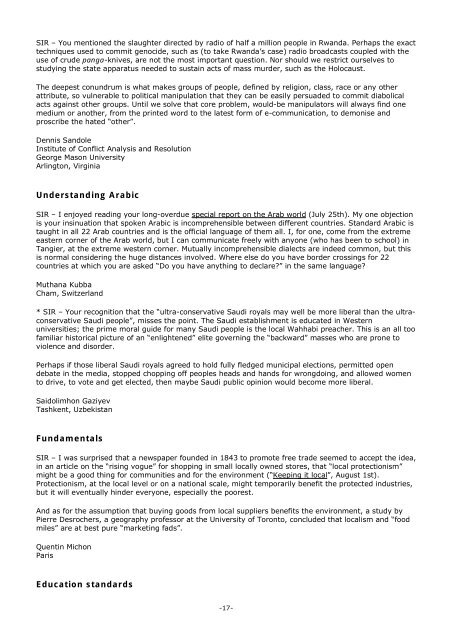Untitled - the ultimate blog
Untitled - the ultimate blog
Untitled - the ultimate blog
You also want an ePaper? Increase the reach of your titles
YUMPU automatically turns print PDFs into web optimized ePapers that Google loves.
SIR – You mentioned <strong>the</strong> slaughter directed by radio of half a million people in Rwanda. Perhaps <strong>the</strong> exact<br />
techniques used to commit genocide, such as (to take Rwanda’s case) radio broadcasts coupled with <strong>the</strong><br />
use of crude panga-knives, are not <strong>the</strong> most important question. Nor should we restrict ourselves to<br />
studying <strong>the</strong> state apparatus needed to sustain acts of mass murder, such as <strong>the</strong> Holocaust.<br />
The deepest conundrum is what makes groups of people, defined by religion, class, race or any o<strong>the</strong>r<br />
attribute, so vulnerable to political manipulation that <strong>the</strong>y can be easily persuaded to commit diabolical<br />
acts against o<strong>the</strong>r groups. Until we solve that core problem, would-be manipulators will always find one<br />
medium or ano<strong>the</strong>r, from <strong>the</strong> printed word to <strong>the</strong> latest form of e-communication, to demonise and<br />
proscribe <strong>the</strong> hated “o<strong>the</strong>r”.<br />
Dennis Sandole<br />
Institute of Conflict Analysis and Resolution<br />
George Mason University<br />
Arlington, Virginia<br />
Understanding Arabic<br />
SIR – I enjoyed reading your long-overdue special report on <strong>the</strong> Arab world (July 25th). My one objection<br />
is your insinuation that spoken Arabic is incomprehensible between different countries. Standard Arabic is<br />
taught in all 22 Arab countries and is <strong>the</strong> official language of <strong>the</strong>m all. I, for one, come from <strong>the</strong> extreme<br />
eastern corner of <strong>the</strong> Arab world, but I can communicate freely with anyone (who has been to school) in<br />
Tangier, at <strong>the</strong> extreme western corner. Mutually incomprehensible dialects are indeed common, but this<br />
is normal considering <strong>the</strong> huge distances involved. Where else do you have border crossings for 22<br />
countries at which you are asked “Do you have anything to declare?” in <strong>the</strong> same language?<br />
Muthana Kubba<br />
Cham, Switzerland<br />
* SIR – Your recognition that <strong>the</strong> “ultra-conservative Saudi royals may well be more liberal than <strong>the</strong> ultraconservative<br />
Saudi people”, misses <strong>the</strong> point. The Saudi establishment is educated in Western<br />
universities; <strong>the</strong> prime moral guide for many Saudi people is <strong>the</strong> local Wahhabi preacher. This is an all too<br />
familiar historical picture of an “enlightened” elite governing <strong>the</strong> “backward” masses who are prone to<br />
violence and disorder.<br />
Perhaps if those liberal Saudi royals agreed to hold fully fledged municipal elections, permitted open<br />
debate in <strong>the</strong> media, stopped chopping off peoples heads and hands for wrongdoing, and allowed women<br />
to drive, to vote and get elected, <strong>the</strong>n maybe Saudi public opinion would become more liberal.<br />
Saidolimhon Gaziyev<br />
Tashkent, Uzbekistan<br />
Fundamentals<br />
SIR – I was surprised that a newspaper founded in 1843 to promote free trade seemed to accept <strong>the</strong> idea,<br />
in an article on <strong>the</strong> “rising vogue” for shopping in small locally owned stores, that “local protectionism”<br />
might be a good thing for communities and for <strong>the</strong> environment (“Keeping it local”, August 1st).<br />
Protectionism, at <strong>the</strong> local level or on a national scale, might temporarily benefit <strong>the</strong> protected industries,<br />
but it will eventually hinder everyone, especially <strong>the</strong> poorest.<br />
And as for <strong>the</strong> assumption that buying goods from local suppliers benefits <strong>the</strong> environment, a study by<br />
Pierre Desrochers, a geography professor at <strong>the</strong> University of Toronto, concluded that localism and “food<br />
miles” are at best pure “marketing fads”.<br />
Quentin Michon<br />
Paris<br />
Education standards<br />
-17-








![[ccebbook.cn]The Economist August 1st 2009 - the ultimate blog](https://img.yumpu.com/28183607/1/190x252/ccebbookcnthe-economist-august-1st-2009-the-ultimate-blog.jpg?quality=85)



![[ccebook.cn]The World in 2010](https://img.yumpu.com/12057568/1/190x249/ccebookcnthe-world-in-2010.jpg?quality=85)
![[ccemagz.com]The Economist October 24th 2009 - the ultimate blog](https://img.yumpu.com/5191885/1/190x252/ccemagzcomthe-economist-october-24th-2009-the-ultimate-blog.jpg?quality=85)